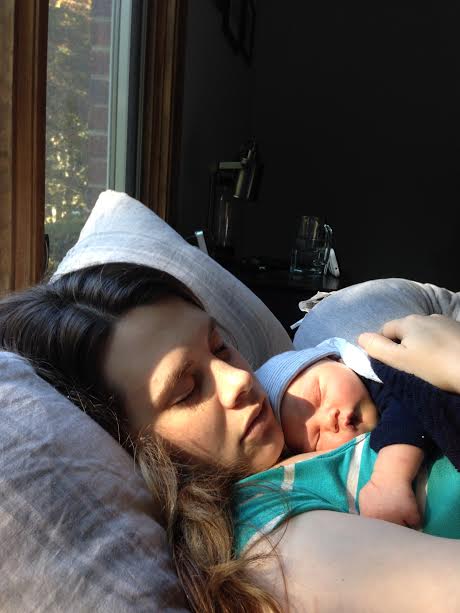By guest blogger Nichole
There was never a doubt in my mind that I would breastfeed. My mother nursed all of her children; to me, it always seemed normal, blasé, even. (I have a sister who is six years younger than me, and I vividly remember trying to catch milk like raindrops when I would take showers with my mother and she would let down.) Mom had described breastfeeding as one of the most, if not the most, rewarding experiences of her life. It came naturally to her (and apparently to her children as well). So when I became pregnant, breastfeeding didn’t even seem like a choice; it was just what I would do.
I count myself extremely lucky that, much like my mother, nursing came naturally to me and my son. Hank was born on September 22, 2013, and he latched like a champ from the very beginning. Hank was (and still is) an “eager eater” according to our lactation consultant (nursing for 45 minutes on each side the night he was born), and I have “amazing nipples” (one of the strangest compliments I have ever received from a heterosexual woman). Even our “problems” weren’t problems. Hank has reflux, but is a “happy refluxer,” gaining weight at a steady pace and smiling through his constant spit-up. I had, believe it or not, too much milk and had to block feed for a period of time.
But despite my eagerness to speak with a lactation consultant about the “problems” that weren’t, I did not speak to anyone about the emotional problems I was having every time I nursed. Eight or more times a day, for four months, when I nursed, I experienced panic attacks. And until three weeks ago, I hadn’t told anyone.
I can’t entirely articulate the reason for my silence. Having suffered from anxiety and depression for years and having spent a considerable amount of time actively engaged in cognitive behavioral therapy, I knew how to identify and deal with panic attacks. Perhaps because I possessed these tools, it never seemed like I needed to tell anyone. Of course, even with this knowledge, a panic attack is tiring and taxing, often requiring some mental gymnastics to quiet the feelings and thoughts accompanying it.
If I really, truly consider the reason for not speaking-up, I think it was because the panic attacks made me feel so different, so disconnected from the feelings I thought I would have while breastfeeding. I expected euphoria, connection. But I was feeling anxiety, disconnection. And there was no reason for me to be feeling these feelings. I loved my baby; breastfeeding was so easy. I was being so irrational.
But that’s the thing about anxiety and depression. They aren’t rational. But “rationality” makes feelings neither less real nor less painful.
Just like I did not know my reasons for silence, I do not know why I finally decided to break that silence. Three weeks ago, my mother was visiting. I was quizzing her about extended breastfeeding, and I mentioned in passing that I might not breastfeed as long as I would like because of the feelings of anxiety I had been having. My husband, well-versed in my struggles with anxiety and depression immediately encouraged me to speak with my OB, lactation consultant, and/or therapist. Upon doing so, and conducting some research, I discovered I have Dysphoric Milk-Ejection Reflex (“D-MER”). In sum, when prolactin is released during breastfeeding, dopamine, a prolactin inhibitor, drops. Some women either feel this dopamine drop more acutely than others or have a dopamine drop that is more marked than what is expected. This dopamine change can cause feelings of “dysphoria,” typically anxiety or depression. It can range from mild to severe. It can be treated, and, for many women, it goes away after breastfeeding for some time.
Thankfully, five months into breastfeeding my son, the D-MER seems to be subsiding. But as I write my story of D-MER, I wish I had not remained silent. I wish I had said something sooner. For me, motherhood has brought the most intense feelings of both connection and disconnection. Never before have I felt so connected to a human being, my son, but I have also never felt so disconnected from my social circle. Every day, I feel that I have never been more connected or disconnected to my husband. I’ve never been so in tune with what I need and so unable to actually achieve those needs. The moments of connection are enthralling, euphoric. The moments (or even days or weeks) of disconnection can be devastating. I let D-MER be another point of disconnection when I could have spoken-up about it and used it connect me to a community of mothers who also experience it.
My hope in writing my story is that mothers that experience D-MER (and even those that don’t) will talk to someone long before I did. That we will reach-out and overcome the feelings that D-MER causes by seeking help and connection. For more information, I encourage you to begin here: http://d-mer.org/Home_Page.html.
All my love to you badass mommas,
Nichole














